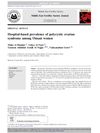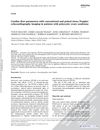 10 citations,
January 2019 in “The Nurse Practitioner”
10 citations,
January 2019 in “The Nurse Practitioner” PCOS is a common hormonal disorder in women, treated with lifestyle changes, medication, and patient education.
 10 citations,
January 2019 in “Advances in Clinical and Experimental Medicine”
10 citations,
January 2019 in “Advances in Clinical and Experimental Medicine” Certain variations in the vitamin D receptor gene are linked to an increased risk of polycystic ovary syndrome.
 10 citations,
January 2018 in “Seminars in Reproductive Medicine”
10 citations,
January 2018 in “Seminars in Reproductive Medicine” The document concludes that women with PCOS need a comprehensive care model that covers reproductive, metabolic, and psychological health to improve their quality of life.
 10 citations,
February 2017 in “Hormone Molecular Biology and Clinical Investigation”
10 citations,
February 2017 in “Hormone Molecular Biology and Clinical Investigation” Metformin effectively improves metabolic symptoms in women with PCOS, while alfacalcidiol does not have a significant impact.
 10 citations,
March 2016 in “The Journal of Obstetrics and Gynecology of India”
10 citations,
March 2016 in “The Journal of Obstetrics and Gynecology of India” The article suggests renaming Polycystic Ovarian Syndrome (PCOS) to "Hyperandrogenic Persistent Ovulatory Dysfunction Syndrome" (HA-PODS) for accuracy and consistency, but no final decision was made.
 10 citations,
September 2015 in “Gynecological Endocrinology”
10 citations,
September 2015 in “Gynecological Endocrinology” Both treatments reduced excessive hair growth in PCOS, but there was no difference in weight, hair score, hormone levels, or insulin resistance.
 10 citations,
October 2014 in “Journal of Ovarian Research”
10 citations,
October 2014 in “Journal of Ovarian Research” The IRS-2 Asp/Asp genotype may increase the risk of PCOS in Chinese women, especially if they are not obese.
 10 citations,
January 2014 in “Endocrinology & metabolic syndrome”
10 citations,
January 2014 in “Endocrinology & metabolic syndrome” PCOS is a long-term condition that needs more research for better understanding and treatment.
 10 citations,
November 2010 in “Journal of Pharmacy Practice”
10 citations,
November 2010 in “Journal of Pharmacy Practice” The document says PCOS is a common hormonal disorder in women, diagnosed by certain criteria, and managed with lifestyle changes and various medications.
 10 citations,
November 2010 in “Skin therapy letter”
10 citations,
November 2010 in “Skin therapy letter” Women with PCOS often have acne because of high androgen levels, and the article reviewed how to treat this type of acne.
 10 citations,
June 2010 in “Fertility and Sterility”
10 citations,
June 2010 in “Fertility and Sterility” Patients with PCOS tend to score their hirsutism higher than clinicians, making self-scoring less useful for diagnosis.
 10 citations,
February 2007 in “Current Opinion in Endocrinology, Diabetes and Obesity”
10 citations,
February 2007 in “Current Opinion in Endocrinology, Diabetes and Obesity” Low birthweight and rapid weight gain after birth may increase the risk of developing polycystic ovary syndrome.
 9 citations,
March 2022 in “Journal of the Endocrine Society”
9 citations,
March 2022 in “Journal of the Endocrine Society” Girls with PCOS have higher levels of certain androgens, which are linked to excess hair growth, but these androgens don't help diagnose PCOS.
 9 citations,
March 2022 in “Frontiers in Endocrinology”
9 citations,
March 2022 in “Frontiers in Endocrinology” About 19.4% of Iranian women in the study have Polycystic Ovary Syndrome, with the most common type involving irregular periods and high male hormone levels, but their heart and metabolic health is similar to women without the condition.
 9 citations,
February 2022 in “Genes”
9 citations,
February 2022 in “Genes” Women with PCOS have more Bifidobacterium in their gut compared to those without PCOS.
 9 citations,
May 2021 in “Frontiers in Cell and Developmental Biology”
9 citations,
May 2021 in “Frontiers in Cell and Developmental Biology” DNA methylation changes in women with PCOS could be used as disease markers and suggest new treatment targets.
 9 citations,
March 2020 in “Gene”
9 citations,
March 2020 in “Gene” Certain gene variants in estrogen receptors are linked to polycystic ovary syndrome, mainly affecting metabolism, in Tunisian women.
 9 citations,
March 2019 in “Anthropology and Medicine”
9 citations,
March 2019 in “Anthropology and Medicine” PCOS in India is linked to broader sociocultural and environmental changes, not just diet and exercise.
 9 citations,
November 2015 in “Gynecological Endocrinology”
9 citations,
November 2015 in “Gynecological Endocrinology” Different types of PCOS in Chinese Han women show varying levels of male hormone and metabolic issues.
 9 citations,
September 2015 in “Reproductive Biomedicine Online”
9 citations,
September 2015 in “Reproductive Biomedicine Online” Longer GGN repeats in the androgen receptor gene are linked to polycystic ovary syndrome.
 9 citations,
January 2015 in “Springer eBooks”
9 citations,
January 2015 in “Springer eBooks” The document concludes that managing PCOS involves treating symptoms, regulating periods, and reducing health risks, with specific medications for fertility and metabolic issues.
 9 citations,
December 2013 in “International journal of gynaecology and obstetrics”
9 citations,
December 2013 in “International journal of gynaecology and obstetrics” Polycystic ovary syndrome (PCOS) is a major health issue for women in Egypt, affecting 14% of fertile women and 37.5% of infertile women.
 9 citations,
August 2013 in “Middle East Fertility Society Journal”
9 citations,
August 2013 in “Middle East Fertility Society Journal” About 7% of Omani women visiting a gynecology clinic had polycystic ovarian syndrome, similar to rates in other countries.
 9 citations,
February 2013 in “Hormone and Metabolic Research”
9 citations,
February 2013 in “Hormone and Metabolic Research” Mutations in the CYP21A2 gene are not a major factor in causing PCOS.
 9 citations,
May 2010 in “Gynecological Endocrinology”
9 citations,
May 2010 in “Gynecological Endocrinology” Young women with PCOS and no other heart risk factors have normal heart function.
 9 citations,
July 2009 in “Journal Of Endocrinology, Metabolism And Diabetes Of South Africa”
9 citations,
July 2009 in “Journal Of Endocrinology, Metabolism And Diabetes Of South Africa” The document concludes that managing PCOS involves treating symptoms and reducing long-term metabolic risks, with lifestyle changes being important.
9 citations,
February 2007 in “JAMA” PCOS is a common inherited condition causing cysts, irregular periods, and increased diabetes risk in women.
 9 citations,
January 2007 in “Gynecological Endocrinology”
9 citations,
January 2007 in “Gynecological Endocrinology” A woman was the first known case to have both polycystic ovary syndrome and autoimmune polyglandular syndrome type 2, suggesting a need to check for both conditions in similar patients.
 9 citations,
January 2006 in “American Journal of Clinical Dermatology”
9 citations,
January 2006 in “American Journal of Clinical Dermatology” Malassezia yeast might be linked to more hair shedding.
 8 citations,
May 2021 in “Reproductive Biology and Endocrinology”
8 citations,
May 2021 in “Reproductive Biology and Endocrinology” Different levels of anti-Müllerian hormone can help diagnose polycystic ovary syndrome in women of different ages.





























